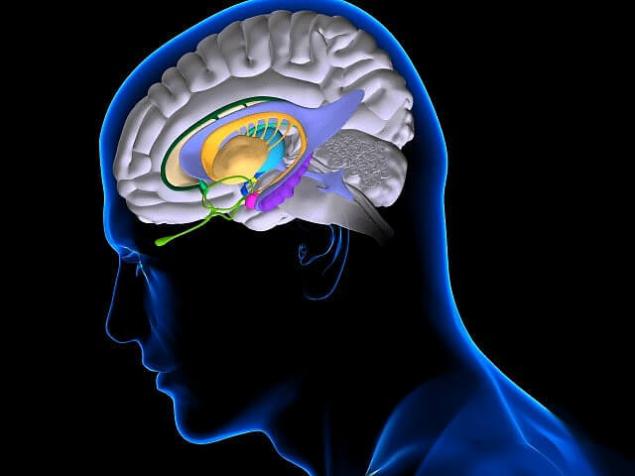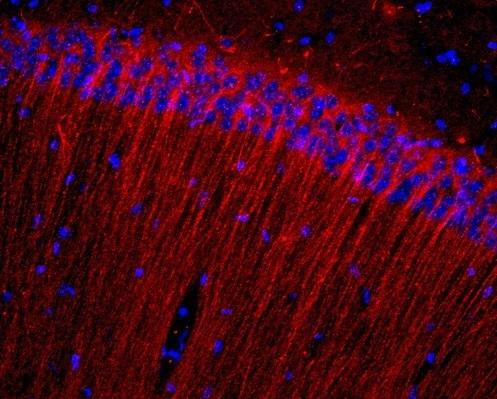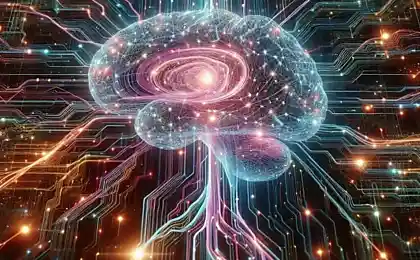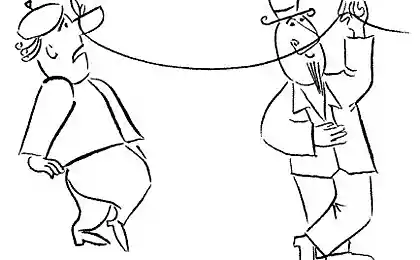389
Long stress erases memory
Prolonged psychological stress, through the immune system, affects the state of the memory centers in the brain.
Researchers from Ohio state University reported in his article in The Journal of Neuroscience that a long stress has a bad effect on short term memory. In other words, what we remember, for example, from childhood, we will remember, but something just read, or some kind of urgent may well fly out of my head – if we are in a prolonged psychological stress. However, to say here "we" means to overtake a few of the events: so far, the experiments here set only on mice.

The hippocampus and other subcortical structures of the human brain; the hippocampus is painted purple. (Photo by Fernando Da Cunha / BSIP / Corbis.)
First Godbout Jonathan (Jonathan P. Godbout) and his colleagues taught mice to find a way out of the maze, and when the animals remembered where to go, they repeatedly hoisted the larger and more aggressive "guest". Soon the mice had characteristic signs of psychological stress: they become anxious, avoided social contact at all, etc. But most importantly, they forgot the way out of the maze. Those who stress not satisfied, remember the correct way, as before. Problems with memory lasted for several weeks after the mice had ceased to scare the arrogant and powerful neighbor. At the same time in the brain of stressed animals had signs of inflammation – in particular, increased the number of immune cells macrophages. Particular attention was paid to the hippocampus – a brain area that serves as one of the main centers of memory and at the same time involved in emotional reactions. (Of course, that the relationship between psychological stress and memory in the first place was looking for it.)

The hippocampal neurons.
For some time after stress in the hippocampus appears fewer new neurons than usual. If the mice were given an anti-inflammatory agent, the memory problems disappeared, and the number of macrophages in the hippocampus decreased, although depressive behavior problems with the new nerve cells were preserved.
General conclusion is this: stress via the immune system increases the inflammatory background in the brain, which in turn, weakens short-term memory – at least the part of it which deals with orientation in space. The connection between stress and inflammation is now generally actively researching all possible methods, because of the inflammatory reaction, albeit not very strong and indolent, can cause a lot of trouble, increasing the likelihood of various diseases, all the way to diabetes and cancer.
However, it should be noted that the relative stress and memory are yet clear away everything. So, in 2013, PLoS ONE published an article which stated that the impact of stress depends on its quantity: first, a deteriorating long-term memory, then, if the stress increases, and short-term – that is, the stress erases any memory, not just short-term. However, those experiments were actually snails, but the study authors argued that their conclusion fair to all animals with more or less complex memory.
On the other hand, in the same 2013 researchers from the University of California at Berkeley published the results of experiments with rats in whichthe animals were subjected to a sharp short-lived stress – and it turned out that it did not inhibit, but rather stimulated the emergence of new neurons in the hippocampus. Most likely, all business in a variety of stressful conditions, which can differ in strength, duration and variety, and the body's response to stress each time will be something different. published
P. S. And remember, only by changing their consumption — together we change the world! ©
Join us in Facebook , Vkontakte, Odnoklassniki
Source: m.nkj.ru/news/28347/
Researchers from Ohio state University reported in his article in The Journal of Neuroscience that a long stress has a bad effect on short term memory. In other words, what we remember, for example, from childhood, we will remember, but something just read, or some kind of urgent may well fly out of my head – if we are in a prolonged psychological stress. However, to say here "we" means to overtake a few of the events: so far, the experiments here set only on mice.

The hippocampus and other subcortical structures of the human brain; the hippocampus is painted purple. (Photo by Fernando Da Cunha / BSIP / Corbis.)
First Godbout Jonathan (Jonathan P. Godbout) and his colleagues taught mice to find a way out of the maze, and when the animals remembered where to go, they repeatedly hoisted the larger and more aggressive "guest". Soon the mice had characteristic signs of psychological stress: they become anxious, avoided social contact at all, etc. But most importantly, they forgot the way out of the maze. Those who stress not satisfied, remember the correct way, as before. Problems with memory lasted for several weeks after the mice had ceased to scare the arrogant and powerful neighbor. At the same time in the brain of stressed animals had signs of inflammation – in particular, increased the number of immune cells macrophages. Particular attention was paid to the hippocampus – a brain area that serves as one of the main centers of memory and at the same time involved in emotional reactions. (Of course, that the relationship between psychological stress and memory in the first place was looking for it.)

The hippocampal neurons.
For some time after stress in the hippocampus appears fewer new neurons than usual. If the mice were given an anti-inflammatory agent, the memory problems disappeared, and the number of macrophages in the hippocampus decreased, although depressive behavior problems with the new nerve cells were preserved.
General conclusion is this: stress via the immune system increases the inflammatory background in the brain, which in turn, weakens short-term memory – at least the part of it which deals with orientation in space. The connection between stress and inflammation is now generally actively researching all possible methods, because of the inflammatory reaction, albeit not very strong and indolent, can cause a lot of trouble, increasing the likelihood of various diseases, all the way to diabetes and cancer.
However, it should be noted that the relative stress and memory are yet clear away everything. So, in 2013, PLoS ONE published an article which stated that the impact of stress depends on its quantity: first, a deteriorating long-term memory, then, if the stress increases, and short-term – that is, the stress erases any memory, not just short-term. However, those experiments were actually snails, but the study authors argued that their conclusion fair to all animals with more or less complex memory.
On the other hand, in the same 2013 researchers from the University of California at Berkeley published the results of experiments with rats in whichthe animals were subjected to a sharp short-lived stress – and it turned out that it did not inhibit, but rather stimulated the emergence of new neurons in the hippocampus. Most likely, all business in a variety of stressful conditions, which can differ in strength, duration and variety, and the body's response to stress each time will be something different. published
P. S. And remember, only by changing their consumption — together we change the world! ©
Join us in Facebook , Vkontakte, Odnoklassniki
Source: m.nkj.ru/news/28347/
Wrong honey: French beekeeper has learned to make honey from cannabis
Five exercises that can replace a complete workout























